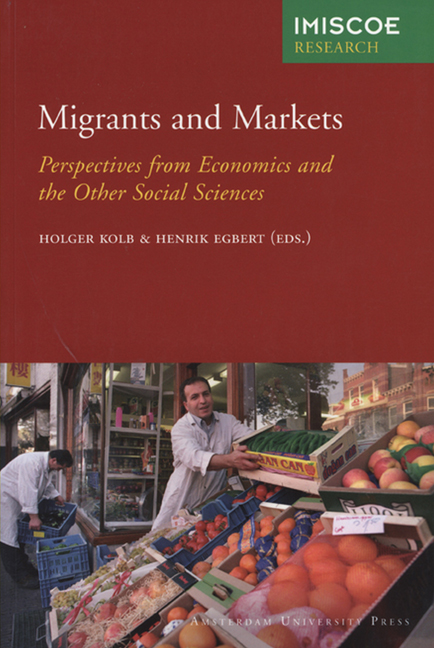Book contents
- Frontmatter
- Contents
- Introduction: Migrants and Markets: Perspectives from Economics and the Other Social Sciences
- The Impact of Immigration on the Labour Market: A Survey
- Investigating the Economic Impact of Immigration on the Host Country: The Case of Norway
- The Exit Option of Labour Migration from East to West Germany: Individual and Contextual Determinants of Unemployed Workers’ Geographic Mobility
- How Recent Amendments in German Immigration Law Affect Decisions: The Case of Polish Doctors
- Educational Selectivity and Labour Market Attainment of Jewish Immigrants from the Former Soviet Union in Israel and Germany in the 1990s
- States as Clubs? The Political Economy of State Membership
- Chinese Student Migration in Europe: A Migration That Nobody Objects To?
- Assessing Interdependencies between Sector Structures and Labour Migration: A Comparative Study of the British and the German Health Sectors
- Workers’ Remittances and International Risk Sharing
- Skills and Remittances: The Case of Afghan, Egyptian and Serbian Immigrants in Germany
- The Impact of Migration on Foreign Trade in Bolivia
- List of Contributors
- Other IMISCOE Titles
The Impact of Migration on Foreign Trade in Bolivia
Published online by Cambridge University Press: 02 February 2021
- Frontmatter
- Contents
- Introduction: Migrants and Markets: Perspectives from Economics and the Other Social Sciences
- The Impact of Immigration on the Labour Market: A Survey
- Investigating the Economic Impact of Immigration on the Host Country: The Case of Norway
- The Exit Option of Labour Migration from East to West Germany: Individual and Contextual Determinants of Unemployed Workers’ Geographic Mobility
- How Recent Amendments in German Immigration Law Affect Decisions: The Case of Polish Doctors
- Educational Selectivity and Labour Market Attainment of Jewish Immigrants from the Former Soviet Union in Israel and Germany in the 1990s
- States as Clubs? The Political Economy of State Membership
- Chinese Student Migration in Europe: A Migration That Nobody Objects To?
- Assessing Interdependencies between Sector Structures and Labour Migration: A Comparative Study of the British and the German Health Sectors
- Workers’ Remittances and International Risk Sharing
- Skills and Remittances: The Case of Afghan, Egyptian and Serbian Immigrants in Germany
- The Impact of Migration on Foreign Trade in Bolivia
- List of Contributors
- Other IMISCOE Titles
Summary
Introduction
Several studies show that the structure of the national origin of countries’ population plays an important role for trade patterns. For developing countries the relationship can be weaker, as those economies are in the process of structural changes. Still, taking into consideration the impact of the migration flows on trade, the migration policy can be formed more optimally to support the economic development of the country.
We test the hypothesis that the migration flows have significant impact on foreign trade in developing countries but the impact is smaller than in developed countries. We use quarterly data of migration, exports and imports of Bolivia for the years 1990 to 2003. Following previous studies we apply the methodology of gravity equation. The estimation of the migration data is based on an attrition coefficient for inflows and stocks of migrants. We control for GDP and for traditional trade cost variables: prices, distance and the adjacency of trade partners. We compare our estimation results to the results of previous studies on developed countries.
The paper is structured as follows. First, trade and migration linkages are discussed based on the available literature. Second, we describe migration and trade patterns in Bolivia. Third, we explain the methodology applied and the data used. Finally, we introduce the estimation results, followed by conclusions.
Trade and migration linkages: theory and empirical evidence
In the literature we can find description of linkages between migration and trade in both directions: impact of foreign trade on migration flows and impact of migration on foreign trade flows. As expected, the migration officials and researchers focus generally on trade impact, especially foreign trade policy impact on migration (see e.g. Morrison 1982). Economists, on the contrary, usually study the impact of migration, more precisely the impact of immigration on foreign trade flows (see e.g. Wagner et al. 2002 for an overview).
In empirical studies, the effect of migration to trade is more recognised compared to the other way round. Parsons (2005) claims that there is ‘a robust and positive relationship between immigration and bilateral trade flows’, but the effect of foreign trade on migration is rather ‘indirect and not necessarily significant’ (Morrison 1982: 7).
- Type
- Chapter
- Information
- Migrants and MarketsPerspectives from Economics and the Other Social Sciences, pp. 224 - 241Publisher: Amsterdam University PressPrint publication year: 2008



